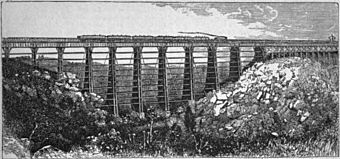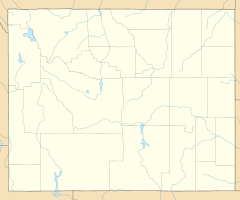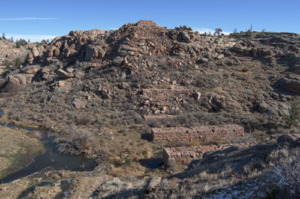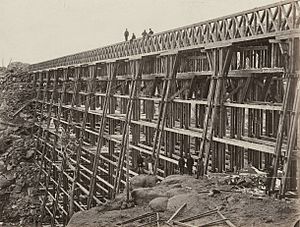Dale Creek Crossing facts for kids
Quick facts for kids |
|
|
Dale Creek Crossing (48AB145)
|
|

Original Dale Creek Wooden Bridge of 1868
|
|
| Nearest city | Laramie, Wyoming |
|---|---|
| Built | 1868 / 1876 |
| Architect | Union Pacific |
| NRHP reference No. | 86001027 |
| Added to NRHP | May 09, 1986 |
The Dale Creek Crossing was a huge challenge for engineers building America's first transcontinental railroad. It was finished in 1868 in southeastern Wyoming Territory. This crossing was 650 feet (200 meters) long.
The Dale Creek Bridge was the longest bridge on the Union Pacific Railroad (UP). It stood 150 feet (46 meters) above Dale Creek. This spot was about two miles (3.2 km) west of Sherman, Wyoming. The land near the bridge was very high, at 8,247 feet (2,514 meters) above sea level. Workers had to cut through solid granite rock for almost a mile to reach the bridge site from the east. They also faced solid rock on the west side, where they made another cut one mile (1.6 km) long.
Contents
Building the Dale Creek Bridge
The First Wooden Bridge
The first bridge was a wooden structure called a trestle. It was completed in 1868. When the first train crossed on April 23, 1868, the bridge swayed in the wind. Carpenters quickly worked to make the bridge stronger. Sadly, two workers fell to their deaths during this time. Even after repairs, the wooden timbers of the bridge still bent under the weight of passing trains.
The Stronger Iron Bridge
The original wooden bridge was replaced in 1876. A new iron bridge was built on the same piers from 1868. This iron bridge was made by the American Bridge Company. The wooden sections leading up to each end of the bridge stayed in place. In 1884, the western wooden approach caught fire and had to be fixed.
To make the bridge even stronger, the Union Pacific installed new supports in 1885. These included girder spans and granite abutments. Engineers also added guy wires to both the wooden bridge and its iron replacement. These wires helped to keep the structures steady.
"Standing on its tall, spindly iron legs that looked as sturdy as knitting needles, it was the highest and most dangerous crossing on the line. Engineers had to slow the train to 4 mph (6 km/h), or a stiff Wyoming wind would push empty boxcars into the rocky gap."
A New Path for Trains
The iron "spider web" bridge was taken down in 1901. This happened because the Union Pacific Railroad built a new path over Sherman Hill. This big project made the Overland Route shorter by about 30.47 miles (49.04 km). The new path meant the Dale Creek Crossing was no longer needed.
Images for kids






